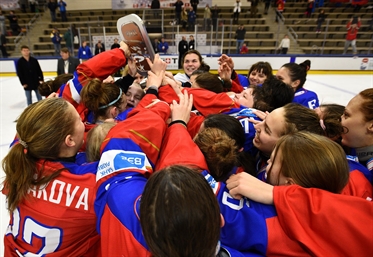Exchange of ideas
Exchange of ideas
Russians benefit from North American training

 The Russian players celebrate the bronze medal win at the 2015 IIHF Ice Hockey U18 Women’s World Championship. Photo: Matt Zambonin / HHOF-IIHF Images
The Russian players celebrate the bronze medal win at the 2015 IIHF Ice Hockey U18 Women’s World Championship. Photo: Matt Zambonin / HHOF-IIHF Images
Call it a glitch. Call it fate. Call it whatever you want.
But, the HarborCenter’s technical difficulties in trying to play the Russian national anthem after the team’s 3-1 triumph over rival Czech Republic in the preliminary round might have awoken the program.
Russian coach Alexander Ulyankin (via translator) said, “The ladies sang the song themselves. I think it brought us together for the rest of the tournament and gave us a reason to believe.”
Following that empowering moment the team saw its way to the bronze medal game – once again facing rival Czech Republic. The Russians cruised to a 5-1 victory, and this time, the anthem played right on cue.
It was the first time the Russian U18 women’s team heard their anthem while standing on a World Championship podium. Previously, it had been six attempts with nothing to show for it.
“We were all working for it really hard,” Rita Dorofeyeva said. “We were going for it because the Czech Republic beat us for the bronze medal the year before.”
“We had to win,” she emphasized.
Ulyankin and Dorofeyeva are joined by Daria Teryoshkina and Yekaterina Dobrodeyeva at the IIHF Women’s High-Performance Camp in Lake Placid – the quartet is looking to build off their historic moment in Buffalo.
For Dorofeyeva and Teryoshkina – who goes by the nickname “Dasha” – North America is actually home right now as they look to develop their game and their world experience.
Dorofeyeva is enrolled at the King’s-Edgehill School in Nova Scotia – a private school that she sought out a few years ago through an agency in Moscow, her home city.
“It was a decision I made to play hockey in North America,” the 16-year-old said with perfect English skill.
“I’m excited about taking what I’ve learned about the Canadian and American style of hockey and adding it to our Russian way of playing,” she added.
Besides hockey lessons, Dorofeyeva has received a great deal of support within her school community.
Following the bronze-medal victory, Kings-Edgewood head coach Amanda Boulegon crafted an article on the school’s website which said in part, “Rita challenged her teammates to work together and push each other, hold each other accountable, and most importantly, never give up,” she wrote.
“We are very fortunate to have one of our own compete on a national stage and bring home many stories and lessons for her teammates.”
It’s a similar story for Teryoshkina, who attends the Hockey Training Institute in Ontario and has one year left before making a decision on the future.
Both Dorofeyeva and Teryoshkina are enjoying their lives in North America and admit they have a tough decision about the future. They’ve elevated their skill level to potentially receive college offers from NCAA or CIS schools. They’ve also thought about returning to Russia to further their schooling and careers.
They both shrugged off the question of which they’ll choose by answering with a simple “we’ll see.”
The two players – who were chosen to attend the camp based on their leadership and playing ability – also share a similar mindset in terms of advancing women’s hockey in Russia.
“When you think about it, we only have 700 female players in Russia,” Dorofeyeva said.
“I think the U.S. has 91,000 and Canada has 86,000. We have to get more women to play.”
Winning helps and both believe last year’s bronze medal could help to get more girls involved with the game, but there is definitely work to be done on that front.
It was a year of winning for Ulyankin, a man with 26 years of coaching experience, six of those at the U18 women’s level. This past year, he also won the gold medal at the World University Games in Spain by defeating Canada in the final match.
Following the win, Ulyankin and the team were invited to meet Vladimir Putin for an awards ceremony. Besides meeting the President, Ulyankin is also proud of two of his former players – Denis Kokarev (Dynamo Moscow) and Yevgeni Ryasenski (CSKA Moscow) – who won the 2012 IIHF Ice Hockey World Championship gold medal in Finland and Sweden.
Overall, Ulyankin says 2015 was the highlight of his career and hopes to bring more success with him back to Russia.
The Tver native sees a need for more structure within the youth ranks of Russian women’s hockey moving forward.
“We need to have a detailed plan for each age group as they advance through hockey,” Ulyankin said.
“A checklist of standards so every player and coach is on the same page.”
This is a prominent area of teaching at the High Performance Camp as USA Officials share nutrition, training, practice, mental skill and other plans with the various coaches from around the world.
Ulyankin mentioned a more unified coaching and training system would make it easier for coaches and players alike.
He also believes a standardized thread of coaching and training will close the disparity gap at the senior women’s level where Russia won bronze medals in 2001 and 2013.
Ulyankin and his players will have six short months to implement their learnings before the 2016 IIHF Ice Hockey U18 Women’s World Championship in St. Catharines, Canada, where Russia will look to stand on the podium again.
And you can bet they’d happily sing their anthem again, music or no music.
Back to Overview









































